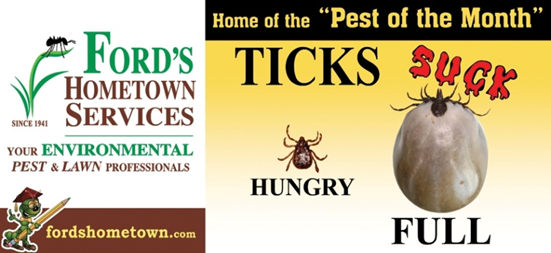Ford’s Pest of the Month: Deer Tick
| . Posted in advice, extermination, News - 0 Comments
 The life cycle of the deer tick lasts two years. The female deer tick lays approximately 3,000 eggs in the spring and then the larvae, practically invisible to the naked eye, emerge several weeks later and feed on white-footed deer mice, voles, chipmunks and other small animals. They drop off their host, go into a resting or pupa stage and emerge the following spring as molting nymphs. They again feed on larger animals, including humans, until they finally reach the adult stage that fall season. They remain on their host fully engorged until spring, drop off, lay eggs and so, the cycle begins once again.
The life cycle of the deer tick lasts two years. The female deer tick lays approximately 3,000 eggs in the spring and then the larvae, practically invisible to the naked eye, emerge several weeks later and feed on white-footed deer mice, voles, chipmunks and other small animals. They drop off their host, go into a resting or pupa stage and emerge the following spring as molting nymphs. They again feed on larger animals, including humans, until they finally reach the adult stage that fall season. They remain on their host fully engorged until spring, drop off, lay eggs and so, the cycle begins once again.
The deer tick is the main carrier of Lyme disease, which is a bacterial infection. Not always, but a ring shaped bull’s eye type of rash often times may be seen within the first 4-20 days after being bitten. Common symptoms vary from; fever, chills, headache, stiffness in joints and fatigue which often times mimic the symptoms of arthritis and or the common flu.
Lyme disease is preventable by taking the right precautions. Where long sleeves and pants and spray your clothing with an appropriate insect repellent. If an attached tick is found, use tweezers to grasp the tick firmly and pull gently, otherwise body parts will remain in the skin causing infection. Other diseases spread by ticks are: Babesiosis, Ehrlichiosis, Rocky Mountain Spotted Fever, Southern tick-associated rash illness, Tick-borne relapsing fever, and Tularemia.
Our trained applicators will begin with a Blanket Spray that will kill ticks present on the property. We will focus on lawn areas, planting beds, and walls where ticks are likely to be found. Also, we will spray up to 10 feet in and 3 feet high into the surrounding borders (if applicable) to further your insect protection. Then on each scheduled return visit we will spray all borders again to kill and repel them. As an extra added benefit, tick applications are also proven to repel fleas, ants, spiders, mosquitoes and other biting insects as well.
Are you beeing bugged? Contact us at FordsHometown.com!
Geoffrey Ford, Vice President
Ford’s Hometown Services




